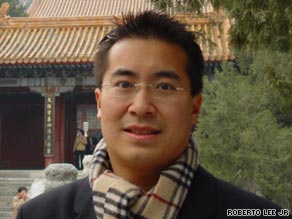
Roberto Lee Jr, 35, is the President of Fresh Bread & Company in Shanghai. He has an MBA from USC Marshall School of Business and an Executive MBA (EMBA) from INSEAD and Tsinghua University in Beijing.
Roberto tells CNN how his EMBA has helped his career. CNN: Tell us about your current role. Roberto Lee Jr: I’m president of Fresh Bread & Company, in Shanghai, which I started in 2004. We supply finished products like sandwiches, cakes and desserts for Starbucks, Walmart, Metro AG, Tesco, and a number of franchised restaurants. We also have a more upscale chain with bakeries, coffee shops and the biggest bread chain in the Shanghai subway system. We currently have 620 employees, 32 shops in Shanghai, and we hope to expand into Eastern China next year. CNN: You already had an MBA, what made you decide to do an EMBA RL: We are hoping to expand Fresh internationally, at least in Asia, and it could become an international company. The Tsinghua/INSEAD EMBA is a really global MBA. We had classes in Beijing, Shanghai, Singapore, Abu Dhabi, and Fontainebleau (in France) so it gave a very international focus.
Profile: Roberto Lee Jr
Name: Roberto Lee Jr
Age: 35
Born: Los Angeles, California
Position: CEO/President of Fresh Bread & Company, in Shanghai
Business education programs:
MBA from USC Marshall School of Business.
EMBA from Tsinghua University in Beijing & INSEAD
In each city INSEAD arranged for guest speakers from very large companies to tell us about the business environment in each country. It gave me much more of an international focus. CNN: How has that global focus helped you with your business RL: In my class I had senior people from 17 countries. We became like a family and we are still in touch. I’ve been in different countries the last few years and my classmates have entertained me and showed me around in each of the countries. Down the road, if we decide to go into some of these countries, I have contacts and I’ve learned from my classmates, from their past experiences and the experiences they’re going through. CNN: What was the biggest difference between the MBA and the EMBA RL: A key difference is seniority. The average age on the MBA was 28 and on the EMBA it was 37. On an MBA people are getting ready to move into senior management, whereas much more senior management things being discussed on the EMBA. The other difference is that for the MBA you take off two years of your life. With the EMBA you still work, so every five to six weeks you meet for a week or two and you go to classes. With the EMBA you don’t get spend as much time on the books, so an MBA is more theoretical and with the EMBA you learn a lot more from your classmates. I had numerous high-level people in my class and they shared how they’ve done things in the past. Read more business related features CNN: So because you’re working at the same time, can you put what you’ve learned into practice RL: That’s what was really cool — all my classmates did it, taking stuff from class and applying it. I was able to get help from my finance professor about international standards for how some things are done on the books. The professors all have working experience — they’re not just people with PhDs who teach — so you can ask for advice and even now I can email them and ask their advice. CNN: Can you think of any example where you’ve directly applied something you learned from the EMBA to your business
Don’t Miss
Budget career boosts
The MBA matchmaker
Special: Executive Education
Get expert advice from CNN’s Biz Clinic
RL: We learned about how one company got all its senior managers together and went out for a weekend brainstorm to set out their strategy for the next year. That’s something we did this past year at Fresh, and we set out a really clear path and goals. So far we’ve met all our goals this year, so it was a really great way of doing it. CNN: Would you have got where you are today without the EMBA RL: It helped me out a lot — I don’t think I’d be as complete a manager as I am today without the EMBA. It’s given me a broader perspective for being a manager for all departments. My strong point has always been sales and when the company started that was the area I pushed the hardest, but now I’m diving more into finance, accounting, marketing and HR. After the EMBA I have a much clearer idea what’s going on in my company within all the different departments — that’s where it’s really been a huge help for me. CNN: What would you say to people put off by the expense of an MBA RL: If you’re going to do an EMBA program, do a good one. Tuition plus time and expense will usually run into six figures in U.S. dollars, but if you get into a good program it’s very worth it.